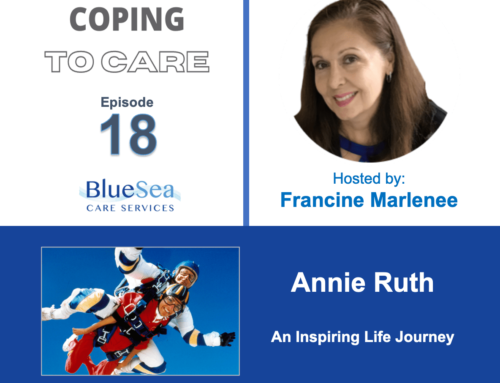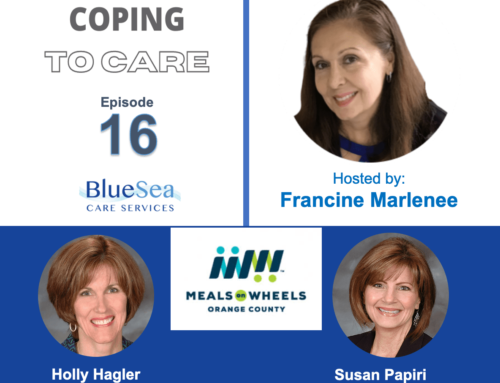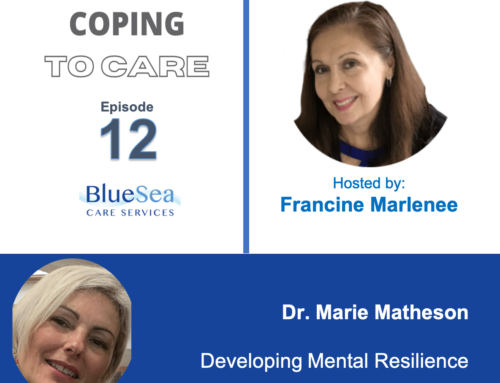Listen to this Coping to Care episode, where we speak with Dr. Michael O’Brien about practicing optimism during a time of crisis.
O’Brien is a successful executive educator, CEO, leader, teacher, author, and sought-after expert. He is the founder of the O’Brien Group. Click here to learn more about his practice. O’Brien is an executive leadership educator in the healthcare industry and assists leaders who are facing dramatic changes to find optimistic solutions that drive groups forward. His latest book is Quicksilver, a revolutionary way to lead the many and the few, beginning with you.
The Practice of Optimism
Dr. O’Brien begins by stating that optimism is best thought about by having a set of practices. Many believe that they want to be optimistic or “chin up.” However, if you aren’t currently optimistic, it’s not something that simply happens without a little work.
Initial Steps to Becoming More Optimistic
The first step is to realize that it is ok to not be ok.
Recognize that the emotions you are experiencing may stay for a while, but eventually, like a guest, they will leave.
Look at what you can change with what is happening right now, especially when looking at senior mental health. Maybe you need to change your plans because what you need isn’t available or doesn’t work for you right now.
Looking at what you can think or do to slide from pessimism to optimism will contribute to better mental health.
As an example, ask yourself, “What relationships can I develop while we’re going through this crisis?”
This is the time to improve and to work at things differently. We need to look at this time as an opportunity to look into activities, hobbies, and interests that we can pick up now that we couldn’t before. This is a way to change your perspective with things such as senior mental health.
Information Overload and How to Cope
We are faced with information relating to economics, health, and the community. Learning how to mentally manage this information is essential.
Dr. O’Brien highlights that it is important to limit how much information you take in. Don’t watch news feeds all day long and keep your TV on. If a story is important, it will get through to you. It’s not essential to continue finding the details with what is happening. It is important for senior mental health and those around them to start practicing limitations on information consumption.
When you put yourself in the position of consumption, you need to be smarter with what you consume and how you interact with the information that is available. And be aware of the media’s negative information intended to grab your attention and to jolt you.
This is a different process than before, specifically because of the changes from the 30 minutes of news and 1 newspaper. It’s now 24/7 with more outlets that are available.
It’s important to be a conscious consumer of the news and to spend more time making more contributions and trying to get into the practices of optimism. Making plans and making a difference instead of consuming negative information is more important during this time.
We can affect the people, projects, families, companies we are in right now. We need to focus on that. What is that you can do to manage your life and even help others around you to manage their lives? This kind of positive outlook will help you feel better now and in the future.
Making a Difference with Optimism
Dr. O’Brien states that it is important to become humble by the virus and the changes that have occurred.
Safe practices, such as from the CDC and WHO, can help us to learn how to live with the risk. It’s as important to learn how to live with our own reactions as a part of ours and senior mental health.
Dr. O’Brien states that our initial reaction is to respond with fear and to be scared as this is how we are designed to be. We are the descendants of humans that learned how to be afraid. If they didn’t know how to be afraid, they would be killed by predators or enemies.
While fear is natural, it is important to learn how to live with it so it doesn’t consume us. Mitigating risk and having a life that works, contributes, and is satisfying to us is important.
Instead, live the best life you can and continue to contribute in the best way that you can.
Listening to Others Differently
Dr. O’Brien states that an important element is not only within our own practices of mitigating risk but also in how we approach others with their complaints and experiences.
Behind every complaint is a disguise for a request. For instance, someone who doesn’t want to wear a mask is looking for an excuse not to wear a mask. Acknowledging their issue and highlighting that we need to mitigate the risk is a better way to respond.
Appreciating someone who is suffering and doing the best by connecting to others will assist with creating optimism with relationships and others.
This practice assists in managing your mental health while continuing to connect with others in a healthier manner.
Are You the Victim of Your Mind?
Too often, we become victims of our own minds. We are designed to experience subjectively. How do I feel, what happened to me, etc?
Civilization depends on others being objective instead. Consciously realizing that you are not your feelings will change the discomfort. If you don’t have your discomfort, it will have you.
Discomfort helps us focus and pay attention. If you are on a freeway and see a car coming toward you, you react and move away.
A lot of things we fear now are not imminent death. Even with Covid-19, we can mitigate the risk and reduce fear.
Optimism comes from mitigating the risk and being able to build your confidence by doing what you can to get over that fear as a part of senior mental health.
We Will Get Through This
Dr. O’Brien says he believes that the nation will make it through the virus and adapt to the changes. He says the creativity, freedom, and expressions of the country will help create a better outcome.
He also believes that a crisis like the pandemic requires individuals to allow themselves to focus on feelings of optimism to help mitigate fear and anxiety. From this, we can become creative, innovative, and build our lives differently.
In life, all we need is something to do, someone to love, and something to look forward to.
Things you do today may be different than before. Take action, look out for those around you, lead by example, move others from complaints to requests, and have things to look forward to.




